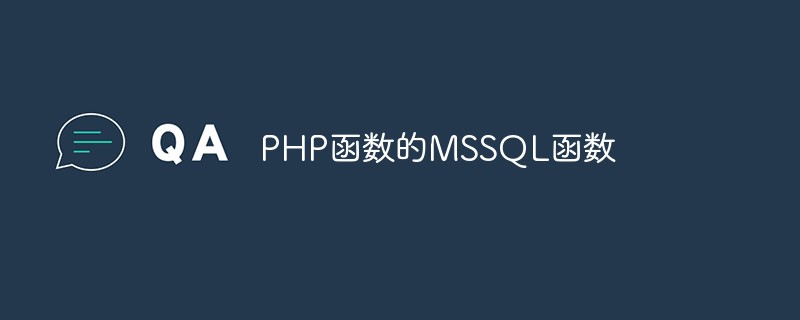In order to call PHP functions efficiently, follow the following best practices: Reduce the number of calls: use caching, lazy loading, and function inlining. Use the appropriate syntax: Choose between regular calls, method calls, or static method calls for different situations. Optimize parameter passing: avoid passing large data or objects, use default parameter values and type hints.

How to call PHP functions efficiently
In PHP development, calling functions is a common operation. In order to improve the efficiency of your program, it is crucial to understand and adopt appropriate function calling techniques. This article will explore the best practices for efficiently calling functions in PHP and provide practical cases for reference.
1. Reduce the number of function calls
Function calls will generate additional overhead, especially when the function contains complex logic or performs time-consuming operations. To reduce the number of function calls, consider the following strategies:
- Cache the results of a function: If the results of a function do not change frequently, you can use a cache to store the results and avoid each call All are recalculated.
- Lazy loading function: Loading functions only when needed can reduce unnecessary memory overhead and execution time.
- Function inlining: Inlining small functions into the calling code can eliminate the overhead of function calls.
2. Use appropriate function calling syntax
PHP provides different function calling syntax, choosing the most appropriate syntax can improve efficiency:
- Regular function call: Use
function_name(arg1, arg2, ...)syntax. This method is the most flexible, but less efficient. -
Method calling: When calling class methods, use the
$object->method_name(arg1, arg2, ...)syntax, which is more efficient. -
Static method call: Methods declared as
staticin a class can useClass_Name::method_name(arg1, arg2, ...)Syntax call, no need to instantiate objects, the most efficient.
3. Optimize function parameter passing
When calling a function, passing parameters consumes additional memory and execution time. Optimizing parameter passing can improve efficiency:
- Avoid passing large arrays or objects: Passing large arrays or objects as function parameters may cause performance degradation. Consider breaking them into smaller units or using passing by reference.
- Use default parameter values: Set default values for optional parameters to reduce the number of parameters passed.
- Use type hints: Specifying the type of function parameters can help PHP optimize.
Practical Case
The following code demonstrates the use of function caching and lazy loading to improve the efficiency of PHP function calls:
<?php
function expensive_function() {
// 耗时操作
}
$cache = [];
function cached_expensive_function() {
global $cache;
if (!isset($cache['expensive_function'])) {
$cache['expensive_function'] = expensive_function();
}
return $cache['expensive_function'];
}
// 使用缓存后的函数
$result = cached_expensive_function();
// 使用延迟加载
if (function_exists('my_function')) {
my_function();
}By adopting these best practices, you It can effectively improve the efficiency of PHP function calls, thereby enhancing the overall performance of the application.
The above is the detailed content of How to call PHP functions efficiently. For more information, please follow other related articles on the PHP Chinese website!
 php函数返回值可以有几个Apr 26, 2022 pm 08:14 PM
php函数返回值可以有几个Apr 26, 2022 pm 08:14 PMphp函数返回值只能有一个。在PHP中,函数返回值使用return语句定义,语法“return 返回值;”。return语句只能返回一个参数,即函数只能有一个返回值;如果要返回多个值的话,就需在函数中定义一个数组,将返回值存储在数组中返回。
 php传参都是字符串吗Dec 15, 2022 pm 03:07 PM
php传参都是字符串吗Dec 15, 2022 pm 03:07 PM不是,php传参可以是字符串、数字、布尔值、数组等。从PHP5.6版本开始支持传递数组参数,函数的形式参数可使用“…”来表示函数可接受一个可变数量的参数,而可变参数将会被当作一个数组传递给函数,语法“function 函数名(...$arr){//执行代码}”。
 详细介绍PHP函数和方法的区别Mar 24, 2023 am 09:45 AM
详细介绍PHP函数和方法的区别Mar 24, 2023 am 09:45 AM随着互联网技术的发展,PHP已经成为了非常流行的开发语言之一。身为一个PHP开发者,了解PHP函数和方法的区别是非常重要的,因为它们在编写代码的时候都是必不可少的。在本文中,我们将详细介绍PHP函数和方法的区别。
 php函数的参数赋值有哪几种Apr 24, 2022 pm 12:10 PM
php函数的参数赋值有哪几种Apr 24, 2022 pm 12:10 PMphp函数的参数赋值有3种:1、值传递赋值,将实参的值复制一份再赋值给函数的形参;2、引用传递赋值,把实参的内存地址复制一份,然后传递给函数的形参,进而将实参值赋值给形参;3、直接给函数的参数指定默认值,语法“函数名(参数变量='值')”。
 PHP函数的命名规范及规则May 19, 2023 am 08:14 AM
PHP函数的命名规范及规则May 19, 2023 am 08:14 AMPHP作为一种非常流行的脚本语言,有着强大的函数库支持,其函数的命名规范和规则对于开发效率和代码可读性都有着重要的影响。本文将介绍PHP函数的命名规范及规则。一、命名风格在PHP中,函数名需要严格符合命名规范和规则,规范主要包括两个方面:命名风格和命名规则。1.下划线命名法下划线命名法是PHP函数命名最常用的方式,也是官方推荐的一种方式。遵循这种方式的函数名
 PHP函数的迭代器函数May 19, 2023 am 08:11 AM
PHP函数的迭代器函数May 19, 2023 am 08:11 AM随着现代编程语言的不断发展,编程的效率和功能性也不断提高,其中PHP作为一种广泛使用的服务器端脚本语言,也在不断地更新和完善其自身的功能列表。PHP函数的迭代器函数就是其中的一种新功能,为PHP程序员提供了更加灵活和高效的编程方式。在本文中,我们将详细介绍PHP函数的迭代器函数的相关知识。什么是PHP函数的迭代器函数?在介绍PHP函数的迭代器函数之前,我们首
 PHP函数的MSSQL函数May 18, 2023 pm 11:31 PM
PHP函数的MSSQL函数May 18, 2023 pm 11:31 PMPHP是一种开源的服务器端脚本语言,通常用于开发Web应用程序。PHP具有易学易用、灵活、性能优异等优点,因此在Web开发领域得到了广泛应用。而MSSQL作为一种流行的关系型数据库管理系统,也被PHP所支持。在PHP中实现MSSQL数据库操作,需要使用MSSQL函数。MSSQL函数可用于连接数据库、执行查询语句、读写数据库中的数据等操作。接下来,将详细介绍一
 php中递归函数是啥意思May 31, 2022 pm 12:01 PM
php中递归函数是啥意思May 31, 2022 pm 12:01 PM在php中,递归函数指的是自调用函数,也就是函数在函数体内部直接或间接地自己调用自己;使用递归函数时,需要在函数体中附加一个判断条件,以判断是否需要继续执行递归调用,当条件满足时会终止函数的递归调用。


Hot AI Tools

Undresser.AI Undress
AI-powered app for creating realistic nude photos

AI Clothes Remover
Online AI tool for removing clothes from photos.

Undress AI Tool
Undress images for free

Clothoff.io
AI clothes remover

AI Hentai Generator
Generate AI Hentai for free.

Hot Article

Hot Tools

Dreamweaver Mac version
Visual web development tools

Safe Exam Browser
Safe Exam Browser is a secure browser environment for taking online exams securely. This software turns any computer into a secure workstation. It controls access to any utility and prevents students from using unauthorized resources.

Zend Studio 13.0.1
Powerful PHP integrated development environment

SAP NetWeaver Server Adapter for Eclipse
Integrate Eclipse with SAP NetWeaver application server.

SublimeText3 English version
Recommended: Win version, supports code prompts!







